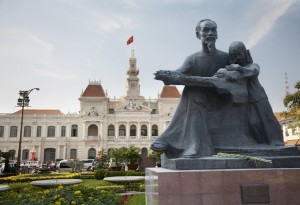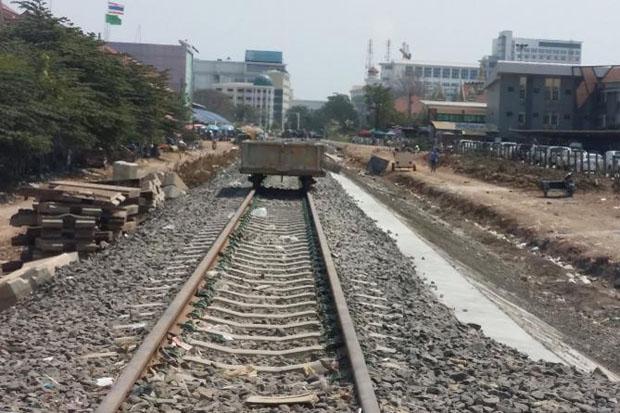
A statue of Ho Chi Minh stands in front of the City Hall building.
Why Ho Chi Minh City’s residential market will prove to be a sustainable investment.
Just months after the liberalisation of Vietnam’s Housing Law on 1 July 2015, allowing for foreign property ownership, the majority of foreign buyers have yet to consider Vietnam as a property investment destination. Such muted response in a market highly rated by institutional investors and property developers (while individual buyers continue to invest in less competitive countries), continues to baffle. On a statistical note, the Urban Land Institute in collaboration with PricewaterhouseCoopers, rated Ho Chi Minh City (HCMC) fifth on its 2016 Asia-Pacific investment prospects ranking, behind only the likes of Tokyo, Sydney, Melbourne and Osaka.
To the sceptics, an overview of Vietnam’s real estate market will put everything into context. In 2008, at the height of the Global Financial Crisis, buyers were queuing up just to pick their choice units. From then on leading up to 2009, the bubble burst and things went downhill, leading to a frozen real estate market. Property prices deflated year-on-year from 2009 to 2013 before the market bottomed out in the lead-up to 2014 (prices in the primary residential market decreased as much as 40 percent over the said period). In 2014, the effect of government policies started
to kick in and consumer optimism in the market returned. Primary residential prices rebounded by as much as 15 percent from 2014 to 2015, and this trend is predicted to continue for the next five years at least. Experts predict that 2016 will be another good year for Vietnam’s real estate industry.
Shining star
At a time when overseas property investments have lost some of their shine due to internal and external turbulence, and the repercussions of China’s slowing economy is impacting countries popular with property investors, Vietnam is the one shining star amid the gloom. Given that Vietnam, and specifically HCMC, is a new market to foreign property investors and is ideally at the start of an upward trend in its property cycle, it provides an opportunity where there are more upsides than downsides to investments, making it very competitive for investors’ money. A brief look at the following reasons will easily identify the opportunities that Vietnamese real estate offers.
Legislatively, the revision of Vietnam’s laws now allow eligible foreign buyers to legally enter the country to purchase and own residential property. The types of projects available to foreign buyers include apartments, villas and townhouses (as long as they are part of a development, and not standalone units). Such property can be leased out, traded, inherited and collateralised, firmly placing the rights of foreigners over property on the same level as locals. Tenure shall be for a period of 50 years, renewable for a nominal fee for another 50 years, very much comparable to the majority of other real estate markets, like the Philippines and Thailand.
Greater affordability
Financially, the general affordability of high-end residential properties allows for a lower investment quantum, creating a situation where there will be lower financial risks associated with buying Vietnam property, yet with more capital upsides. According to a study published by the Japan Real Estate Institute in April 2015, the price comparison of Ho Chi Minh City is newly built high-end residential projects with other markets showed it was still much cheaper compared to other regional cities such as Bangkok, Kuala Lumpur and Jakarta.
Meanwhile, new reforms implemented by the local government are stirring Vietnam’s economy in the right direction. The government had bought back bad debts from banks stuck with very poor asset quality, and by doing so, lowered the ratio of non-performing loans to total outstanding loans (a critical long-standing problem of Vietnam’s). In addition, banks are also undergoing consolidation triggered by the government to make them more effective and create better economies of scale. Above all, the reforms have created a stable local currency that is attractive for exports and foreign investments, and reined in once runaway inflation to less than one percent, allowing for significant credit growth; these augur well for the real estate industry. In addition, the restructuring of state-owned enterprises rife with mismanagement have seen their real estate portfolios (a non-central part of business operations), once used as an excuse for diversification, removed, thus strengthening the real estate market with much-needed creditability.
Where foreign trade relations and bilateral ties are concerned, Vietnam’s trade liberalisation policy has allowed it to be a beneficiary of recently concluded treaties. With the Trans Pacific Partnership (TPP), Vietnam’s economic connectivity to major global markets will improve by leaps and bounds. With the lowering of import tariffs of “made-iin-Vietnam” products, more industries will relocate and setup shop in Vietnam. This will accelerate the country’s growth as a manufacturing powerhouse, made possible by its relatively cheaper labour (when compared to its illustrious neighbour China), and ease of access to port facilities (made possible by its long eastern coast lines and broad river networks). When fully implemented, the signed Asean Economic Community (AEC) will perpetuate a single market in Southeast Asia, allowing Vietnam to experience an increase in GDP, jobs and wages. All these factors will work in Vietnam’s favour to greatly improve its standard of living, increasing the demand for quality housing, and creating a more vibrant and sustainable real estate industry.
Hopes and dreams
Demographically, Vietnam’s favourable situation as depicted in demographic statistics paint a rosy outlook for the real estate market. With a median age of 30, a rapidly growing middle-class forecasted to reach 40 million people by the year 2020, and a high urbanisation rate of 3.5 percent per annum, will create a huge demand for quality housing in the urban centres. Evident of one of the fastest rates of urbanisation in Asia, many Vietnamese are abandoning country life to seek a better future in the cities, so much so that it is putting a strain on infrastructure. According to government figures, there is a shortfall of housing supply to meet the future demands of Vietnam’s young population.
Socially, Vietnam makes a good retirement home, with its low cost of living (even in the cities, when compared to its peers) and low inflation rate; you will be able to stretch and get more out of your retirement fund with cheaper accommodation, healthcare and entertainment, for example. Another important factor will be safety, and in Vietnam, most serious crimes are dealt with by capital punishment. This explains why Vietnam enjoys a low serious crime rate, while most of the crimes we hear about are usually just petty in nature such as snatch theft and burglary. Moreover, Vietnam, by virtue of its ideal geography, allows the abundance of leisure travel from North to South; nature reserves, beaches, mountains, highlands and river deltas provide much needed variety and change in scenery. Last but not least, HCMC City specifically, suffers from no natural disasters; you will not get to experience earthquakes, typhoons, volcanic eruptions or drought (this also mitigates the investment risk of buying tangible assets such as real estate).
Stable and safe
Politically, Vietnam is a nation governed by a single party, the Communist Party of Vietnam. The positive aspect of such a system (evident in China and to a certain extent Singapore), is the stable climate that government policies are allowed time to take root and its effectiveness evaluated; policy-making is coherent and consistent, guided by a single doctrine despite any change in leaders. Economic progress will be forthcoming, and the real estate market will be influenced accordingly (this once again lowers the risk of investment). This is in contrast to the political upheavals experienced by other regional countries such as Thailand, Malaysia and Myanmar, where economic progress stalls every time there is conflict or when a new party comes into power.
All the different aspects above, aligned with one another, have started simmering. According to the HCMC Real Estate Association, since the new laws were put into effect, more than 1,000 transactions from foreign buyers were registered for HCMC properties, while only 250 foreigners bought between the period of 2009 to 2013 for the whole Vietnam. As Vietnam as a real estate destination catches the global wave of investments, fence sitters will start to make advances into the market, and the early movers (foreign buyers) who invested early will reap the benefits of investing early.
Investors in HCMC’s properties can generally expect a competitive gross rental yield of six to eight percent (as compared to other regional investment destinations) and good mid- to long-term capital gains. Based on 2015/2016 forecasts, residential property prices are set to increase by five to eight percent per annum in the near future. These all present a healthy return on investments for the individual investor, and provide a good opportunity not to be missed.
Source: http://www.propertyguru.com.sg/property-management-news/2016/3/120680/abundant-opportunities-in-vietnams-real-estate


